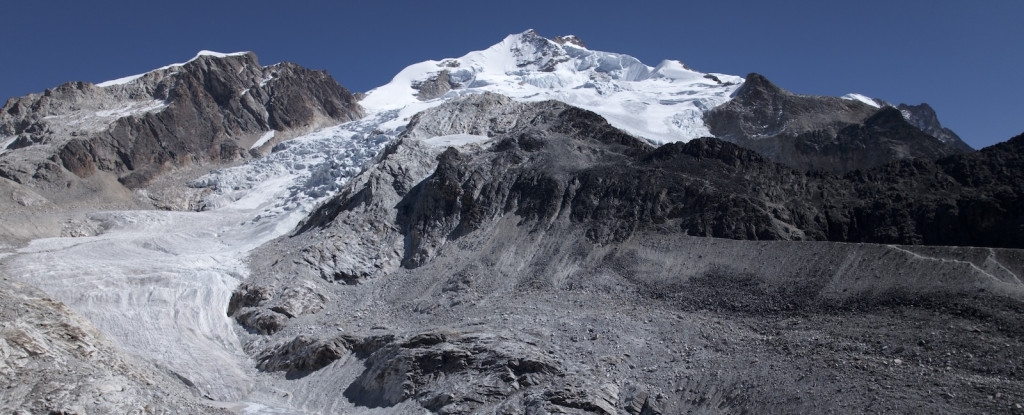Products You May Like
Roughly one out of every four people on Earth depends on freshwater supplied by the glacial regions that cover 10 percent of our planet’s surface.
It’s also a precious resource in crisis, with new research showing just how rapidly these frozen ecosystems are now expected to change.
A new study by an international team of scientists reveals glaciers in the tropics are melting faster than forecast, retreating to sizes researchers hadn’t expected to see for years.
“This shocked us, frankly,” University of California, Berkeley paleoclimatologist Andrew Gorin told New Scientist. “I think this is clear evidence that at least one region in the world has now departed the hospitable climatic conditions that have fostered the development of human civilization.”
Gorin adds, “We’re quickly blowing past climate milestones that we thought were decades away.”
Gorin’s team found a suspicious lack of beryllium-10 and carbon-14 isotopes in the minerals bordering glaciers in the Andes mountains, indicating the last time these rocks felt the warmth of our Sun was at least 11,700 years ago. This suggests parts of the mountain range haven’t seen such a low level of glaciation since before the Holocene – the period that birthed human civilization.
Glaciers collect water in the form of snow through winter and release it during summer melts, providing water for billions. As the glaciers retreat, less freshwater becomes available below.
frameborder=”0″ allow=”accelerometer; autoplay; clipboard-write; encrypted-media; gyroscope; picture-in-picture; web-share” referrerpolicy=”strict-origin-when-cross-origin” allowfullscreen>
The Andes region is already experiencing record breaking droughts and water shortages as a consequence, as well as fatal floods as melt pools burst from the ice that once held them.
But it’s not just in the Andes. Previous research has found accelerating glacial melt from the Himalayas to Alaska as well.
“Glaciers are very sensitive to the climate system that they live in,” explains University of Wisconsin–Madison geoscientist Shaun Marcott. “They really are the place you would look to see some of the first big changes resulting from a warming climate. You can look to these glaciers and imagine what we might be looking at going into the future in other places like the Western United States, which is a no-ice scenario.”
Between decreasing meltwater from receding glaciers and saltwater incursion from rising seas, major rivers like the Magdalena and Ganges will experience decimating flow reductions. This could see entire populations forced to migrate in search of water, warned UN Secretary-General António Guterres in a statement last year.
“In Asia, for example, 10 major rivers originate in the Himalaya region, supplying freshwater to 1.3 billion people living in its watershed,” explained Guterres.
Another recent study by a different group of researchers found just how drastically the local environment can change without a coating of ice.
Analyzing characteristics that include soil properties, microclimate, biodiversity represented by environmental DNA, a team of researchers led by Monash University glaciologist Levan Tielidze found that as the ice retreats, new life is quick to move in to replace the old.
The consequences of this loss of established species and establishment of new interactions isn’t clear. Given it is likely to be a pattern that will spread from the tropics around the globe as the planet warms, we ought to learn more about the impacts of environmental change on surrounding ecosystems.
“Across the globe, from the Alps to the Arctic, glaciers are shrinking, leaving increasingly larger areas exposed both in mountainous regions and around polar ice caps,” says Tielidze.
“The retreat of glaciers is one of the most evident signs of climate change.”
